What is Branding and Why Does It Matter?
We are here to encourage companies to thoughtfully consider every decision they make!
The first impression of someone can be formed around 1/10th of a second, yet we understand that individuals are more complex than these initial judgments.
But when it comes to people’s perceptions about a brand, they think brands are usually afraid of taking risks. A survey by 8ways.ch tells that people typically shape their opinions about your company within approximately 50 milliseconds (0.05 seconds).
Think about it—Coca-Cola equals happiness. And when you hear “Just do it,” you’re probably picturing a swoosh. Big brands have etched their identities into our minds through branding.
But here’s the giveaway! Branding is not just for the big guys, and it’s not a quick magic trick. It’s a journey where results stick around, like a long-lasting regime. Start-ups, small businesses, sole proprietors, e-tailers, and everyone in between can get in on the action too.
So, if you’re manifesting to find out the secret sauce of branding, and want your company to be the Gordon Ramsay of the business world in 2024, buckle up and keep reading!
Definition of Branding
If you look up “branding definition” on Google, you’ll find forty-three different explanations on the first page alone. Even the ones who have mastered “business marketing” academics, don’t understand branding wholesomely.
“Branding” is the way you create and use a unique identity for your business. It involves researching, producing, and marketing a specific character of your “brand”, which helps potential consumers connect with what you offer.
What is brand and branding in marketing?
89% of business readers say that the brand a piece of content comes from is important, and 85% of marketers say the primary reason for creating content is to build the brand and positive perceptions of the company. (Source: Marq)
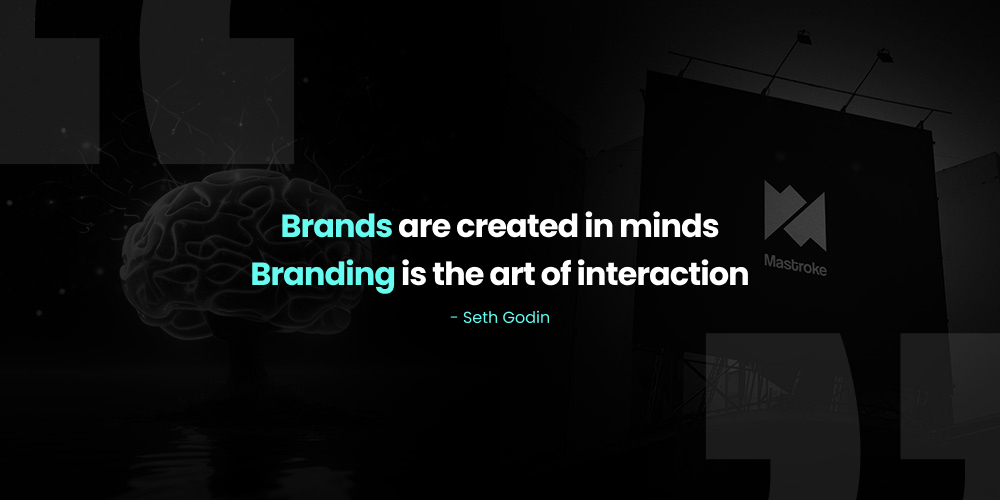
Brand: The Concept
A “brand” is not just a logo or a name; it encapsulates the entire identity and essence of a company, product, or service. It represents the promise and values that a business offers to its customers. A successful brand is built on a foundation of consistency, reliability, and a unique proposition that sets it apart from competitors.
Branding: The Art
The art of “Branding” goes beyond creating an appealing visual identity; it delves into storytelling, creating a narrative that connects with the target audience on a personal and emotional level. It involves a multidimensional approach that includes visual elements like logos, colors, and design, as well as the communication of brand messages through various channels.
Brand Vs. Branding Vs. Identity
94% of consumers are more likely to remain loyal to a business that provides complete transparency, according to a striking study. This supports the notion that a distinct and genuine brand identity promotes trust and enduring customer loyalty. [Source: inc.com]
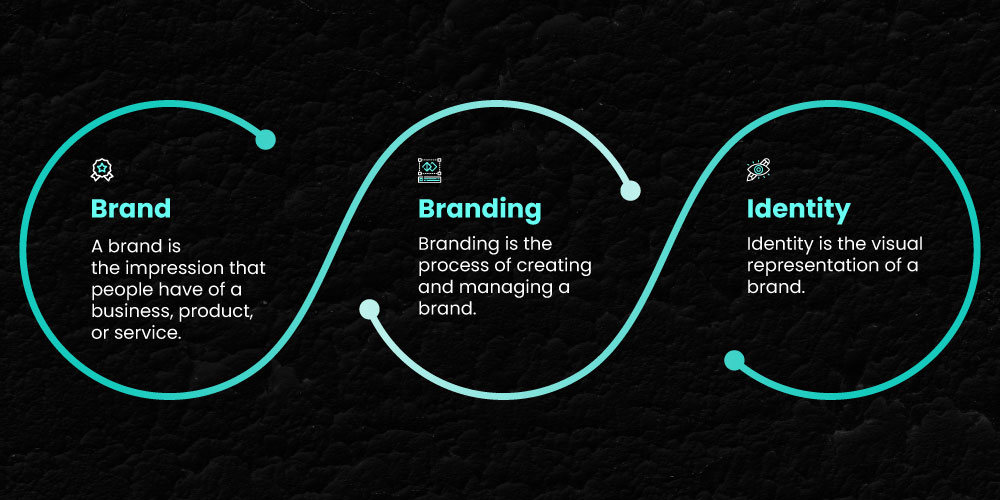
Think of a brand as the soul of an organization, and its identity as its body. Since the foundation of brand identity is its tangible qualities and aesthetic appeal, it appeals to our five senses.
A brand’s logo and “brand identity” are frequently used interchangeably. Even though it is untrue, a logo design can be seen as a component of a brand’s identity. It can be considered a component of sensory marketing, along with a brand’s logo, banner, characteristic color scheme, scent, tagline, and tactile sensation when holding its items. It can appeal to all of our senses. Together, these elements form the brand.
What does it mean to ‘brand’ yourself in the marketing world?
In the marketing world, “branding yourself” refers to the intentional and strategic process of creating a distinctive and memorable personal brand. Just as companies cultivate brand identities to stand out in the market, individuals can shape and communicate their unique identity to differentiate themselves in personal and professional spheres. Branding yourself involves defining and showcasing your skills, values, personality, and expertise in a consistent and compelling manner.
What are the top benefits of creating a strong brand identity?
Crafting a strong brand identity is like giving your brand a unique personality. It’s the key to instant recognition in a crowded market, fostering trust and customer loyalty. This visual and narrative consistency not only sets you apart but also commands premium value. Beyond business, it creates a sense of pride among your team, making them brand ambassadors. In a nutshell, a strong brand identity is not just a visual asset; it’s the heartbeat of your brand, resonating with your audience and leaving a lasting impression.
Checkout the resources on Brand Identity vs. Brand Image
The Importance of Branding:
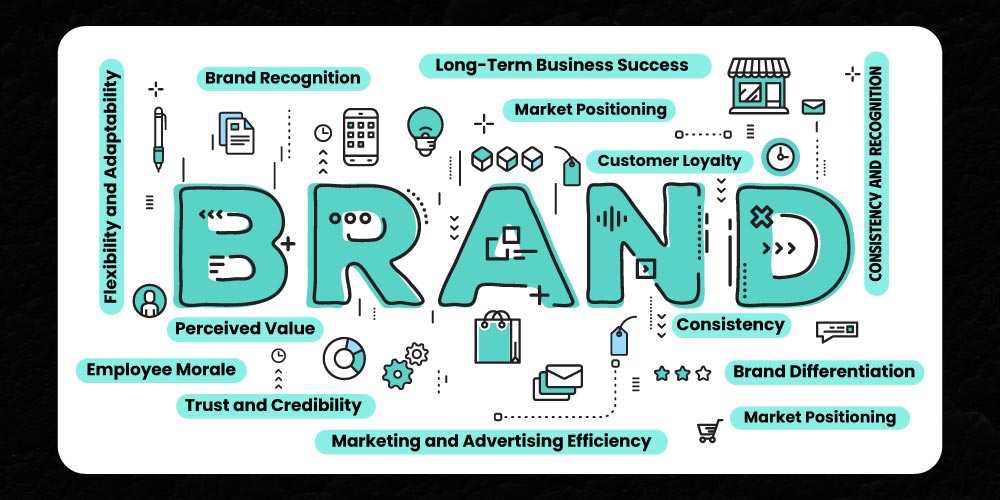
What is the importance of building a brand?
Building a brand is crucial for various reasons, and its importance extends across different aspects of business and personal development. Here are key reasons that will help you stipulate 2024 branding ideas and give you exact information on why building a brand matters:
1. Brand Recognition
Statista reports that 78% of consumers in the U.S. prefer to buy products from brands they know and recognize.
Imagine your brand as a familiar face in a bustling crowd – it’s not just about being seen; it’s about being instantly recognized, evoking a sense of connection without saying a word.
Is a brand image the most important aspect of branding?
Certainly! While brand image is pivotal, branding extends beyond it. Brand positioning, identity, awareness, equity, promise, customer experience, and consistency collectively sculpt a brand’s success. Therefore, each element plays a vital role in shaping perceptions and fostering customer loyalty.
2. Customer Loyalty
Building a base of loyal customers is like laying a strong foundation for your brand. Satisfied customers not only come back but also become your brand’s advocates.
According to a Harvard Business Review study, increasing customer retention rates by just 5% can boost profits by 25–95%.
3. Trust and Credibility
Trust is the currency of successful brands. Establishing credibility through consistent quality and transparent practices is essential for long-term relationships with customers.
4. Brand Differentiation
A Nielsen study found that 59% of consumers prefer to buy products from brands familiar to them, emphasizing the importance of brand differentiation in a competitive landscape.
Your brand is the unique instrument in a symphony of choices. Be an unexpected note, the distinctive melody captures attention and leaves an indelible impression in the minds of consumers.
5. Perceived Value
Consumers often weigh the perceived value of a product or service. Effective branding can enhance this perception, making customers feel they are getting more than just a product.
According to a PwC survey, 60% of consumers globally consider value for money as the most influential factor in brand trust.
6. Consistency
Consistency in messaging, visuals, and product/service delivery reinforces your brand identity. It creates a dependable image that consumers can trust.
How do businesses build a strong brand and reputation?
The marriage of consistency and reputation is potent. Consistency builds trust, and reputation ensures that trust is associated with your brand across various interactions.
7. Flexibility and Adaptability
While consistency is vital, being adaptable to market changes ensures your brand remains relevant. Flexibility allows you to evolve with consumer needs and industry trends.
8. Market Positioning
Envision your brand as a compass guiding consumers through a vast landscape of choices. Your unique market position becomes the North Star, providing direction and clarity in the consumer’s decision-making journey.

Why do businesses need to have a logo?
A killer logo isn’t just eye candy—it’s a trust-builder, shouting out your professionalism. It’s the wingman telling potential clients, “Hey, here’s who we are, what we’re about, and why you want a piece of this.” It’s the universal language that screams.
Looking to harness the power of impactful messaging beyond visuals?
Checkout our resource highlighting 7 successful brand taglines that took the internet by storm
9. Marketing and Advertising Efficiency
A well-established brand requires less effort and cost in marketing. Recognition and trust mean your message resonates more efficiently, maximizing the impact of your marketing efforts.
HubSpot states that 55% of marketers consider blog content creation a top inbound marketing priority, showcasing the role of content ineffective advertising.
10. Long-Term Business Success
Ultimately, all these elements contribute to the overarching goal – long-term business success. A strong brand becomes an asset, propelling sustained growth and resilience in the face of market dynamics.
IV. Types of Branding:
Branding takes on various forms to meet the diverse needs of businesses and individuals. Here are several types of branding:
Product Branding:
– Products with strong branding are 20% more likely to be recommended to others. Source: Nielsen
– 48% of consumers expect brands to know them and help them discover new products or services that fit their needs.
How does branding affect a product?
Branding transforms a product from a mere commodity into a memorable experience. It creates a unique identity, communicates value, and influences consumer perceptions, ultimately driving product preference and loyalty.
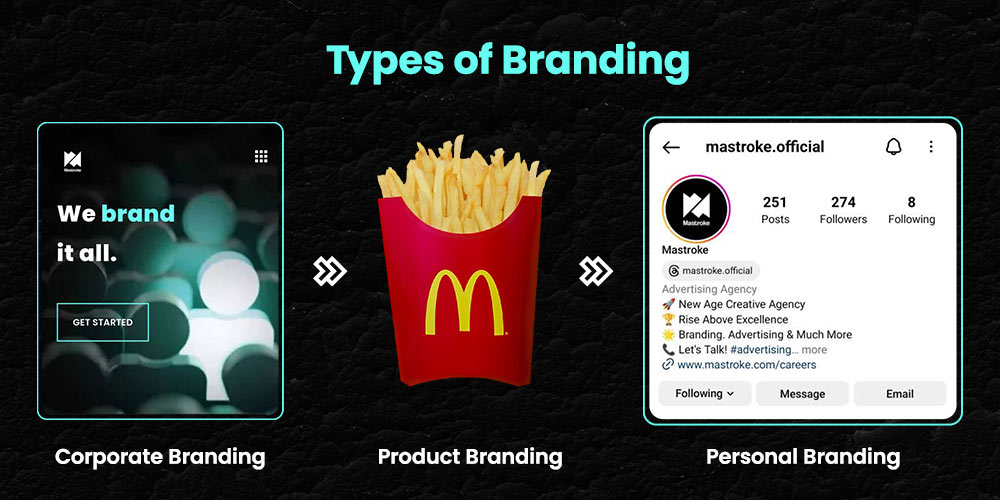
Corporate Branding:
– Companies with strong employer brands see a 50% reduction in cost per hire. Source: LinkedIn
– 69% of job seekers would reject a job offer from a company with a bad employer brand, even if unemployed.
– Brands recognized for corporate responsibility outperform the stock market by 133%.
– Strong corporate brands can command a price premium of 7% more than weaker brands. Source: Harvard Business Review
How does branding help to increase business growth?
Corporate branding establishes trust, credibility, and differentiation in the market. A strong corporate brand attracts customers, fosters employee loyalty, and opens avenues for expansion, contributing significantly to sustainable business growth.
Personal Branding:
– 80% of recruiters consider personal branding important when evaluating job candidates. Source: The Manifest
– 77% of shoppers are more likely to buy from brands that personalize their shopping experience.
– Personal brands with a consistent message across platforms are 20 times more likely to get noticed. Source: Forbes
– 86% of shoppers prefer an authentic and honest brand personality on social media.
How to build a powerful personal brand on social media?
Craft a compelling narrative, showcase expertise, engage authentically, and maintain consistency. Leverage visuals, share valuable content, and actively participate in relevant conversations to build a personal brand that resonates on social media.
Service Branding:
– 82% of customers consider trustworthiness as the most important factor when choosing a service provider. Source: PwC
– 73% of customers fall in love with a brand because of friendly customer service representatives.
Highlighting the intangible!
Service branding emphasizes the experience, reliability, and expertise a service offers. Effective service branding creates trust, enhances credibility, and positions the service uniquely in the market.
Retail Branding:
– 93% of purchasing decisions are influenced by visual appearance. Source: Kissmetrics
– 55% of shoppers prefer to shop in stores with helpful and knowledgeable staff.
Crafting the in-store experience!
Retail branding goes beyond products, focusing on creating an immersive in-store experience. It involves visual merchandising, store layout, and customer service, fostering a brand connection that extends beyond the purchase.
Online Branding:
– 73% of marketers believe that their efforts through social media marketing have been somewhat effective or very effective for their business.
– Visual content is more than 40 times more likely to get shared on social media than other types of content. Source: HubSpot
– According to a survey conducted by Sprout Social, 89% of consumers will buy from a brand they follow on social media, and 84% will choose that brand over a competitor.
Find Latest Social Media Trends in 2024
Can you start an online brand with no money?
Yes, you can kickstart an online brand with creativity and strategic use of free platforms. Utilize social media, content marketing, and networking to establish an online presence. As you grow, reinvest profits into more advanced strategies.
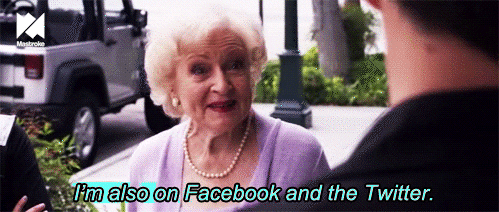
How do you market a brand using social media?
Utilize each platform’s strengths, create visually appealing content, engage with your audience, and leverage influencers. Consistent posting, storytelling, and authenticity are key to building a strong brand presence on social media.
Offline Branding:
– 57% of consumers trust TV ads, making it one of the most trusted advertising channels.
– 92% of consumers trust recommendations from friends and family above all other forms of advertising. Source: Nielsen
– Word-of-mouth marketing drives $6 trillion of annual consumer spending.
Beyond the digital realm!
Offline branding involves traditional channels like print, TV, and events. It reinforces brand visibility in the physical world, complementing digital efforts for a comprehensive brand strategy.
Word-of-Mouth Marketing:
Word-of-mouth marketing relies on satisfied customers becoming brand advocates. It’s fueled by positive experiences, exceptional customer service, and creating a brand story that people want to share, amplifying the reach and impact of your brand.
Branding for Startups
It might be challenging to stand out from the crowd and leave your mark in the industry with so many startups popping up every year. Here’s where creating a powerful brand identity comes into play. Your brand is the core of who you are and what your company stands for; it’s much more than just a logo or a memorable phrase.
Branding: How can startups establish a cohesive brand identity?
Building a powerful startup brand is not merely a luxury, but an absolute requirement. The significance of branding for startups cannot be emphasized, even if they frequently concentrate on raising money or developing new products.

How do you build a great brand on a very small marketing budget?
- Establish an online presence to enhance visibility on search engines.
- Utilize various social media platforms to connect with a broader audience.
- Attract potential clients by providing discounts or special offers.
- Engage audiences visually with a compelling video showcasing your products or services.
- Build a database of interested individuals for targeted marketing and promotions.
- Craft a concise and compelling summary of your business to captivate potential clients or partners.
- Attend events or gatherings to establish personal connections and broaden your professional network.
- Increase brand visibility and engagement by sponsoring or hosting events or contests.
52% of online businesses started with $500 or less. Source: Oberlo
Laurel Mintz, the founder and CEO of Elevate My Brand, suggests that while there is no hard and fast rule when it comes to marketing budgets, companies should aim for a first budget of 12 to 20 percent of gross or expected sales.
Psychological Aspects of Branding: The Power of Branding
The majority of decisions individuals make are not arbitrary or random in nature.
Clever enterprises capitalize on this fact by employing marketing psychology to shape the choices consumers make when purchasing goods or services. If you can devise marketing strategies that effectively sway people towards buying your offerings, you can accelerate your business growth and foster a more devoted customer base.
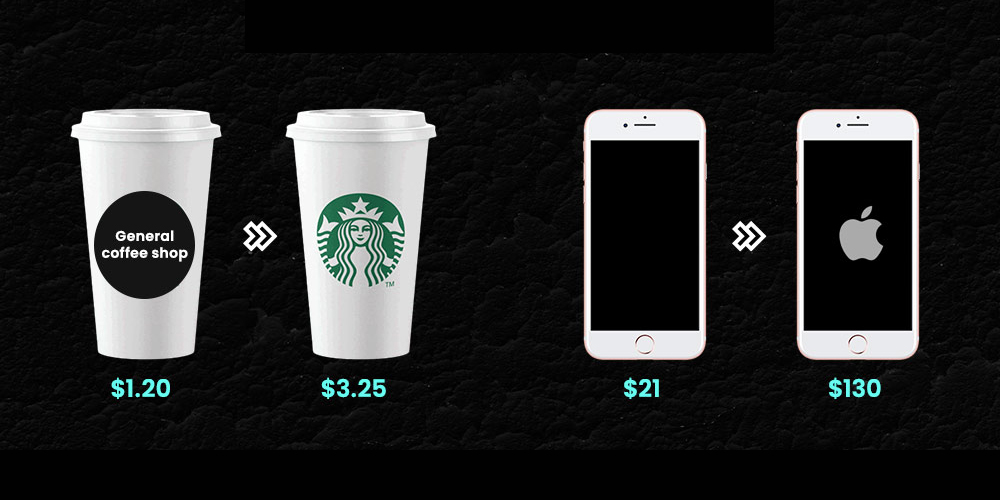
According to the 2023 Brand Finance rating, Apple has a brand worth $297.5 billion. How?—That’s the exact agenda!
Large corporations benefit from teams of seasoned marketers and agencies that assist them in crafting impactful branding and compelling marketing initiatives. As a small business, you may not have the same resources, but you can still employ psychological principles to sway your customers and potential clients.
How do you do branding effectively?
Consistency is key across all touchpoints — from visual elements to messaging — ensuring a cohesive and memorable brand experience. Engaging storytelling can breathe life into your brand, creating an emotional connection with your audience.
Leverage digital platforms to amplify your brand voice and connect with a wider audience. Embrace authenticity; consumers increasingly seek brands that align with their values.
According to a recent survey by Statista, Lastly, 72% of consumers globally prefer brands that are authentic and honest to their audience, respond to feedback, and adapt their branding strategies as necessary. In a dynamic market, staying relevant and resonant is the hallmark of effective branding.
How do branded products affect consumer buying decisions?
The allure of status and luxury associated with certain brands compels individuals to align their choices with symbols of distinction. Skillful marketing endeavors, coupled with consistent messaging, further embed brand identities in the consumer psyche.
Beyond the tangible, brands tap into the intangible sphere of emotions, weaving compelling stories that forge lasting connections. Reviews, recommendations, and perceived value all contribute to the gravitational pull of branded products, shaping not just what consumers buy, but why they buy it.
In essence, the impact of branded products transcends the transactional, becoming a narrative of trust, desire, and identity in the consumer’s journey.
Brand Management 101: How are brands managed?
A study by Forbes found that up to 23% more money may be made if a brand is presented consistently across all platforms. Having a consistent voice, image, and message for your brand helps increase recognition and make it stand out in the crowded market.
Through brand management, an established brand must continuously sustain its reputation. In addition to driving efforts that support a consistent brand message, measuring and managing brand equity, identifying and accommodating new brand items, and strategically positioning the brand in the market, effective brand management also raises brand awareness.
A brand must be developed over many years, and once it does, it must be sustained via ingenuity and originality. Throughout the years, a number of well-known brands have become industry leaders, including Coca-Cola, McDonald’s, Microsoft, IBM, Procter & Gamble, CNN, Disney, Nike, Ford, Lego, and Starbucks.
What are the benefits of having a strong brand strategy?
Your customers aren’t just buyers; they become champions, proudly waving your brand’s flag. Your employees aren’t just team members; they’re brand ambassadors, aligning with its values and contributing to a cohesive work culture.
It’s not just about strategies; it’s about measurable impact, and guiding continuous improvement through data-driven insights. In the tapestry of business or personal branding, your strong brand strategy is the thread that weaves success, creating a narrative that resonates and endures.
Branding Terminology
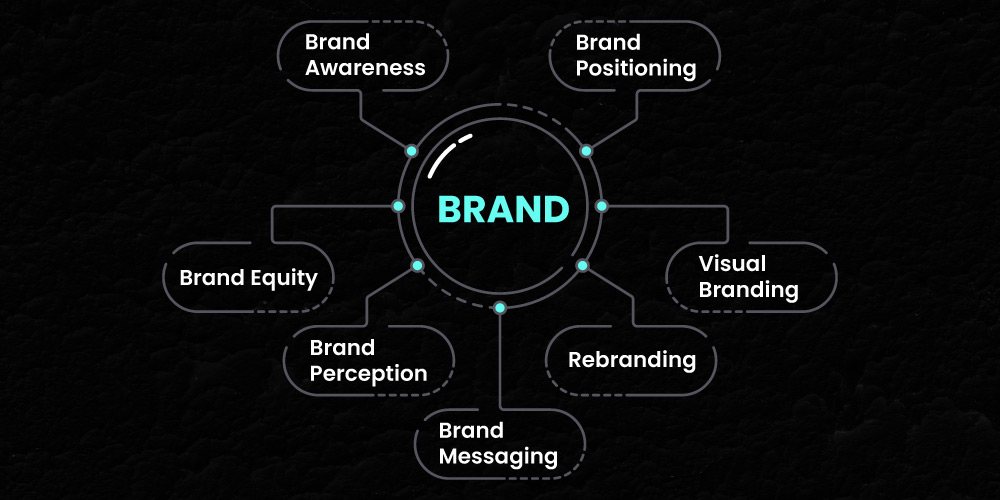
Brand Awareness
Building brand awareness involves creating a strong and memorable brand image through various marketing efforts. One key aspect of brand awareness is recognition. This occurs when consumers can identify a brand by its name, logo, or other distinctive elements.
Brand Positioning
Ever wondered why certain brands feel like old friends, while others seem like passing acquaintances? That’s the magic of brand positioning. In the crowded marketplace, brands are like characters in a story!
Brand Equity
Brand equity is the secret sauce that turns a brand into a valuable commodity. Building brand equity is like earning street cred in the business world. The more positive experiences, killer marketing moves, and an all-around stellar reputation your brand collects, the higher its stock rises.
Brand Perception
Ever judged a book by its cover? Well, we all do it, especially with brands. That’s where brand perception comes into play. It’s like the Instagram filter for your brand – how your audience sees and feels about it.
Why is brand quality more important than brand perception?
Quality is the foundation upon which lasting brand perceptions are built, as satisfied customers become brand advocates. In today’s discerning market, where authenticity is valued, actual product or service quality serves as the bedrock of a brand’s credibility.
According to Epsilon, when brands provide personalized experiences, 80% of consumers are more inclined to make a purchase. Instilling passion into your brand culture can boost these efforts, resulting in enthusiastic customers who are not only loyal but also brand evangelists.
Brand Messaging
What if your brand could speak? That’s the essence of brand messaging. It’s the voice, the personality, the storyteller-in-chief of your brand.
Rebranding
Rebranding, going by its name, comes into play when a brand feels to have a fresh start, a new look, a reinvention. It’s like hitting the reset button but with a lot more pizzazz.
Visual Branding
What’s the first thing that pops into your head when you think of your favorite brand? Welcome to the world of visual branding, where your brand’s appearance is the head-turner at the party. It’s the fashion statement, the style icon, and the visual storyteller that leaves a lasting impression. Consistency is key here – imagine your brand as the trendsetter that always looks good, no matter the occasion.
Design: Why logos include hidden messages in their design?
Hidden messages serve as a bridge between the brand and its consumers, creating a sense of exclusivity and shared understanding. It’s a design strategy that transcends the ordinary, transforming logos into visual puzzles that invite exploration.
Brand Storytelling
A crackling campfire, a canopy of stars above, and your brand assuming the captivating role of a storyteller who leaves the audience spellbound. This is the essence of brand storytelling!
Why is a brand story powerful?
It goes beyond simply marketing products; it involves crafting an emotional connection, a narrative that deeply resonates with your audience. It’s the distinction between merely being a brand and evolving into a legend – a story that lingers in people’s memories, gets shared, and, most importantly, instills belief.
Use brand storytelling to hack your customers’ minds and drive the actions you desire.
It’s no surprise that 55% of consumers who like a brand’s story are more inclined to buy the product in the future, 44% will share the story, and 15% will buy the product right away. [Headstream]
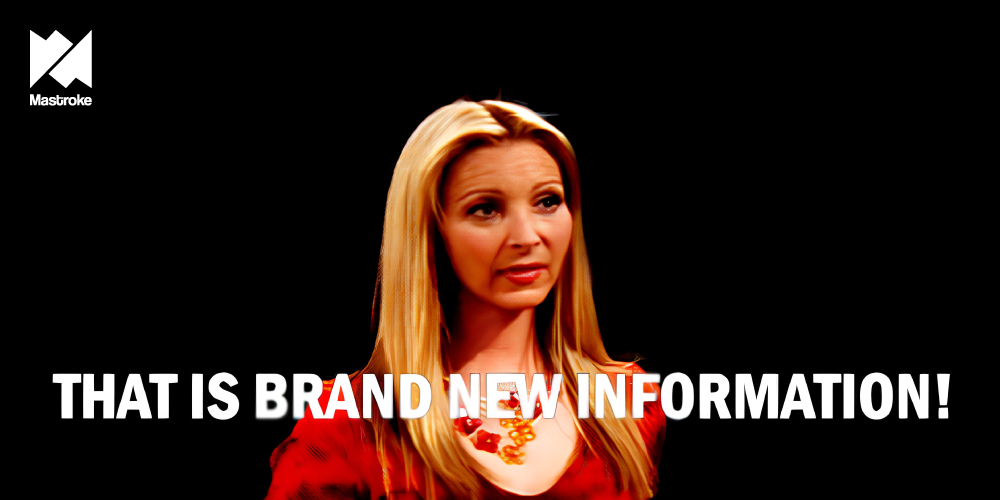
Conclusion
In 2024, the branding terrain is exceptionally dynamic and customer-focused. As businesses persist in producing products, branding remains arguably the paramount element in marketing.
Prioritize a comprehensive understanding of your target market before jumping on branding initiatives for your products and services to effectively resonate with them.
Was this article helpful to you? In the following weeks, we’ll be publishing additional marketing advice. Follow our blog to ensure you never miss an update!

